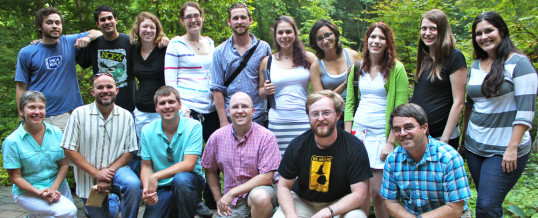The Interfaces of Global Change graduate program was recently featured in Virginia Tech News
Earth’s biodiversity is like a kaleidoscope made up of distinct plants and animals; however, with each year’s turn, unique and irreplaceable species disappear.
Habitat loss, invasive species, pollution, disease, and climate change are all to blame for the current rate of extinction, which is 1,000 times higher now than before human dominance, according to Bill Hopkins, associate professor of fish and wildlife conservation in the College of Natural Resources and Environment and Fralin Life Science Institute affiliate.
Interfaces of Global Change, a new interdisciplinary graduate education program funded by the Virginia Tech Graduate School, directed by Hopkins, and partially supported by the Fralin Life Science Institute, confronts the problem of Earth’s dwindling biodiversity with a dynamic team of faculty members and doctoral students with diverse perspectives and areas of expertise.
Incoming Ph.D. students from any department who are beginning their doctoral studies are invited to apply to the program; currently, faculty members hail from biological sciences, fish and wildlife conservation, history, biological systems engineering, civil and environmental engineering, urban affairs and planning, entomology, forest resources and environmental conservation, geosciences, and plant pathology, physiology and weed science. Students still receive their Ph.D. degree from their home department, but will focus on global change and the science-policy interface.
“The over-arching goal is to bring a diverse group of people together to discuss how global changes such as pollution, disease, and climate interact to affect the natural world that we depend on, and how we might tackle some of the most complex environmental and societal issues today,” Hopkins said. “Problem-solving depends on a diverse set of skills and perspectives, and I think the students have a chance to grow much more here than in a traditional program.”
Graduate student fellows receive research assistantship funding and participate in required interdisciplinary research courses, in which they share perspectives on major environmental problems facing the world and wrestle with complex issues such as research ethics, scientific advocacy, and how science should inform society and public policy.
Fellow Daniel Medina of Panama City, Panama, a doctoral student in biological sciences in the College of Science, said that the program has helped him better understand and articulate his role as a scientist in society. Medina works with Lisa Belden, associate professor of biological sciences in the College of Science, and studies the symbiotic skin bacteria of amphibians, and how they might be used to combat a deadly fungal disease that has caused numerous amphibian population declines and extinctions.
“The interaction with peers in other fields has given me a broader perspective,” Medina said. “The program has also helped me to realize how complex interactions with policymakers can be, even when we share common goals.”
In 2010, the Virginia Tech Graduate School launched the Interdisciplinary Graduate Education Program initiative to promote interdisciplinary graduate education and research and offered the first four programs in fall 2011. Each of these education programs addresses a major fundamental problem or complex societal issue requiring an interdisciplinary team of scholars, according to Maura Borrego, associate dean and director of interdisciplinary programs in the Graduate School at Virginia Tech.
“The [Interdisciplinary Graduate Education Program] approach helps a university take on bigger, more complex problems,” said Borrego, who has spent significant time researching the topic as part of a National Science Foundation Faculty Early Career Development (CAREER) Program. “It appeals to these newer generations of students we’re getting who really want to do meaningful, important work. They’re not just going to college to get a job and to get a pension and money to live on, but they really want to make a mark.”
With support from the Office of the Senior Vice President for Academic Affairs and Provost and research institutes, the Graduate School currently provides funding for 14 interdisciplinary graduate education programs, which revolve around issues as diverse as water for human health and sustainable nanotechnology. Debuting this year are Interfaces of Global Change, Human Centered Design, and Bio-Inspired Buildings.
[hr]


